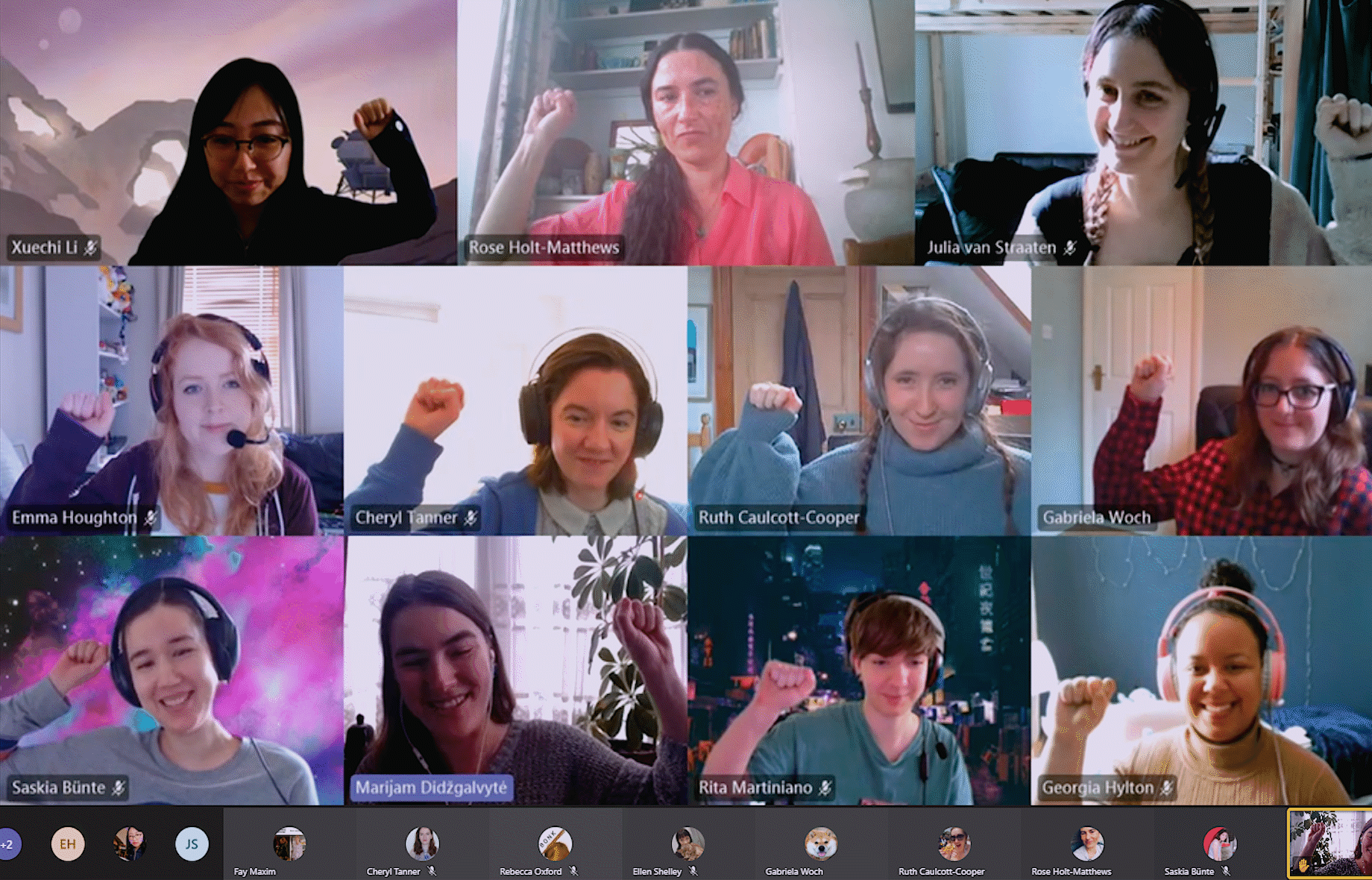As the movement to bring more diversity to games grows and finds more supporters, internships are emerging as a great tool to reach marginalised groups and make the industry more accessible.
Everybody’s Gone to the Rapture developer The Chinese Room started experimenting with internships last year, and launched a six-month programme “designed to remove some of the obstacles that can make it more difficult for those underrepresented in our industry to progress their careers.”
“The starting point [was] just to say why we think it’s important to have a diverse team,” studio director Ed Daly tells the GamesIndustry.biz Academy. “We really just want a diversity of ideas, of minds in the team. We don’t think it’s healthy to have a monoculture creatively, and it’s just more fun, frankly, to work in teams when there’s a good range of people.”
Daly admits that, for a long time, he didn’t realise what could be done to support marginalised groups getting into games, underscoring that supporting diversity (or not) is a choice companies make.
“We don’t think it’s healthy to have a monoculture creatively, and it’s just more fun, frankly, to work in teams when there’s a good range of people”
“I hadn’t realised that was possible, I hadn’t really understood the difference between positive action, in the legal [sense], and what’s illegal, which is positive discrimination,” Daly explains. “So, it was really just a conversation which happened, which led to an understanding that there was this concept of positive action. I probably should have been more aware of that, but I wasn’t. And that led us to come up with this idea.
“The reason that we described it as an internship programme is we wanted [something] that had really low barriers, to encourage the broadest number of people to apply, people who might not feel that they had a chance, and wouldn’t have applied for a regular role. Then we got really interested in, ‘Okay, well, how do we design that? How do we describe that? How do we promote that?’ And just really getting into making the most of the flexibility that positive action enabled us to have.”
Internships are also valuable experiences for the trainees, giving them a chance to work in an industry that they sometimes wouldn’t have been able to access otherwise.
“I think there are lots of people that feel they’d love to work in games, but for some reason or another, they’re not going to get a chance, especially if it can be one where there is proper remuneration. So it is actually possible to do it without incurring practical difficulties. That is an opportunity to get that first bit of experience, and then build and build and build.”
As the internship programme is about to enter its second year, Daly shares the lessons he’s learnt along the way so more studios can implement similar initiatives and drive more diversity into the industry.
Find a structure that works for your studio
Not all internships are created equal. The Chinese Room put careful thoughts into structuring its internships in a way that made sense for its teams and for its interns, around a few key ideas:
- Fairness
- Flexibility (more on that below)
- Availability of the teams to supervise the intern
- Opportunities to learn and grow
At the core of these ideas was the salary: if you want your internship to be attractive, you need to pay your interns at a competitive rate.
“[The internship] was a six-month fixed-term contract,” Daly explains. “We set the salary to be the same as for any other entrant role, so the fact that it was described as an internship and was fixed-term, we still felt we needed to pay, as with any other entrant position.”
Not all divisions within the studio were fit to welcome interns, so The Chinese Room also had to identify which departments were the most appropriate for the programme.
“We were specifically looking for people who wanted to be game designers or producers, so that was the focus,” Daly continues, explaining that the teams identified training-type work ahead of time that didn’t require shipping levels of poslih. These tasks allowed the interns to understand the studio’s workflows and tools.
“We were able to come up with just enough structure to enable some learning to take place, [and] they were able to quite quickly start making a contribution”
Georgia Hylton joined The Chinese Room as the game design intern, and Saskia Bünte as the production intern. Both have since accepted full time jobs at the studio as a result of their internships, respectively as assistant designer and production assistant.
“On the game design side, that was primarily around some level design in both Unity and Unreal,” Daly continues. “For production, it was a little bit more of a general support role, to loop Saskia into all the myriad discussions, meetings, and processes, [as well as] shadow the production team. We were able to come up with just enough structure to enable some learning to take place, but they’re very capable individuals, so they were able to quite quickly start getting things done and making a contribution, as well as learning.
“It was a little bit frustrating that we couldn’t accommodate people that were interested in games art, or animation, or really technical and programming roles. I mean, we anticipated that we weren’t really at scale, and we didn’t have the structure to do that, but it was nonetheless frustrating to need to focus in the way we did. Whether that’s something we can address in the future, yes, to some extent, but we’re probably always going to be a little bit limited in the parts of the team we can accommodate.”
Daly points to other initiatives within the Sumo Group — of which The Chinese Room is part — focusing on more technical roles, such as the Sumo Academy and its programming apprenticeships. This is a topic we recently covered on the GamesIndustry.biz Academy in an article dedicated to diversifying the UK talent pipeline.

The Women of TCR meeting from March 2024 — a monthly gathering for women at The Chinese Room
Flexibility is key
While Daly mentioned several core ideas behind the company’s internship, flexibility was the main pillar supporting the entire initiative. With the aim being to lower the barriers to entry, making sure applicants don’t get put off by rigid criteria is key when setting up such a programme.
Salary is once again part of that equation, as well as flexibility around remote working and working hours, among other things. However, because of the pandemic, Daly says that they ended up not needing most of what they had prepared.
“The fact we were offering additional flexibility, including people working from home, obviously became a moot point, in a way,” he says. “The things that we were offering to really encourage people to apply included flagging the fact that we were very open to accommodating people with any physical or mental requirements, like disabilities. Again, because of the pandemic, no one was in the studio, but that’s something we were fully prepared to do.
“We were aware that people might be put off applying if they had caring responsibilities. We didn’t want that to be a reason not to apply, so we flagged that we would be fully flexible regarding working hours”
“[For] flexible hours, we were aware that people might be put off applying if they had caring responsibilities. We didn’t want that to be a reason not to apply, so we flagged that we would be fully flexible regarding working hours. It was largely about really encouraging people to apply, with lots of these things. We flagged the fact we weren’t going to filter applicants out based on degrees or what university they attended, again with a concern that people might just feel, ‘This isn’t going to be for me.’ We wanted to just be really explicit that those sorts of considerations people might expect would be applied weren’t going to be.”
Applicants who had a break in their career whether because of redundancy or childcare — or any other reason — were also encouraged to apply, and it was clarified that it wouldn’t be held against them in the application process. It’s all about figuring out the typical reasons for which people might feel unable to apply for a position, and removing these obstacles.
“We’re looking to give an opportunity to people for whom those sorts of challenges might have prevented them getting opportunities in the past,” Daly continues. “There were some other things. We were conscious — and this goes back to flexibility around working from home — that if people were concerned about travel costs or the need to be at home, that we wouldn’t insist on people coming to the studio.”
Over 400 people ended up applying for the internship programme, for only two positions. While Daly says they did get applicants from marginalised groups, he adds that they didn’t get as many people from lower-income backgrounds as they were hoping.

The Chinese Room’s Ed Daly
“We didn’t get as many non-graduates as we expected, so maybe there’s something we could do differently in terms of when and where we promote the internship, and some of the language we use, to really encourage those groups as well,” he reflects. “Some of our most successful, veteran developers aren’t graduates, don’t have a degree, or certainly not one with any great prestige. So, we are keen to reach people that maybe are just assuming that they’ve not got a chance of getting a job in the games industry but would like to, but that might not be the case. So, I think in terms of things to learn from, a little bit there, I think, about trying to encourage those groups to apply, and then for us just to think through: ‘What can we do for people who we can’t accommodate?'”
Whether it’s people you can’t accommodate or applicants that you couldn’t offer the job to, Daly recommends to offer something else instead when possible. Feedback is essential and The Chinese Room even offered mentoring to some applicants.
“I don’t know whether we anticipated just quite how many people there would be who were really strong. So, next time round, we’d want to have something in place that we could offer those people when we can’t offer them a role,” Daly says.
The challenges of running an internship
As made abundantly clear by Daly throughout our discussion, running an internship programme isn’t always easy. A lot of preparation goes into setting things up and even when doing everything right, there will always be things that go wrong. So make sure you’re actually ready for this before proceeding.
“I’ve been involved in internships when I didn’t feel the company was prepared properly for providing the space and the time with senior members of staff to support, and to provide an actual learning opportunity for the individual,” Daly says. “I’m sure the worst internships involve people just being brought in without any great plan for what they’ll be doing, especially if they’re poorly paid or unpaid. Then that’s really a bad experience all round.
“The worst internships involve people just being brought in without any great plan for what they’ll be doing, especially if they’re poorly paid or unpaid”
“So, it’s probably a bit trickier if you’re a little bit smaller. I mean, The Chinese Room is not a big studio, but we’re very well supported by the rest of Sumo, so we’re able to have that structure in place, to give the interns a good experience. It’s really the fact that it is an investment of time to teach people and give people the best opportunity to succeed.”
For people applying for internships in games, Daly advises to make sure that the objectives of the company are clear and do include a commitment to provide access to the senior and experienced people that the interns can learn from.
“And if the answers suggest that something else is happening, then [it’s] maybe best to steer clear,” he adds.
For its 2024 internship programme, The Chinese Room is set to offer two roles once again, solely focused on production this time as Daly says it’s an area that gives people a lot of transferable skills.
“We are really keen to get some applicants, if they’re out there, from, let’s say, older workers that have had that career break, maybe redundancy, challenges that I think sometimes could be looked over. The games industry is very young in its demographic. So, I think that’s one of the groups we’re interested in looking at.”
When asked about the one piece of advice he’d give to a company looking to run internships, Daly says it isn’t so much about the internship but more about prioritising underrepresented groups.
“The key bit of advice would be to understand how positive action principles can be applied”
“The key bit of advice would be to understand how positive action principles can be applied, obviously within the rules of what is allowed, and to really dig into that,” he says. “And to flag the fact that it is possible to overtly prioritise those groups, and, all other things being equal with applicants, to select people who are from those groups that are underrepresented in your company, because like I said earlier, I think that is something which not everyone really appreciates.
“I think otherwise, as regards to advice for first steps for an internship, again it’s making sure that there’s a clear point and a clear objective, and that there are the resources and the commitment and availability of people needed to make a success of it.”
More GamesIndustry.biz Academy guides to Working in Games
Our guides to working in games cover various perspectives, from hiring to retention, to landing the job of your dream or creating the right company culture:
GamesIndustry.biz
Source link
Related Post:
- Riot Games diversity figures slowly inching up
- You can soon drive a Ferrari 296 GTB around in Fortnite
- Now you can drive a Ferrari in Fortnite • Eurogamer.net
- Ubisoft executives' next bonus depends on carbon reduction rather than increasing diversity
- Insights about diversity and inclusion from Take-Two's E3 2024 panel
- Shawn Layden: Consolidation is the enemy of diversity
- How to get a job as a diversity and inclusion officer
- The GamesIndustry.biz Academy Jobscast: Recruitment and diversity
- Raccoon Logic's approach to diversity and culture | DLC
- How did the pandemic impact diversity, equity, and inclusion in the industry?
